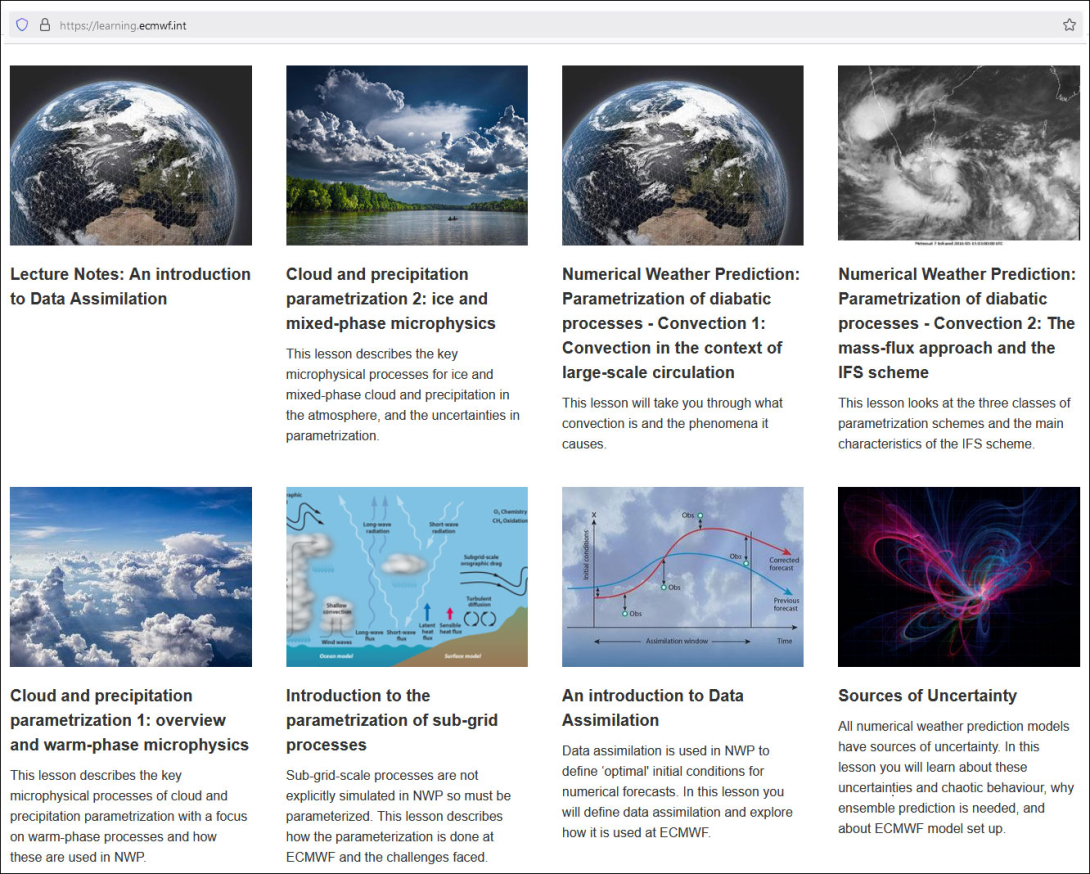As part of its commitment under its Convention, ECMWF is dedicated to providing training that continuously evolves in response to user feedback, shifting priorities, and technological advances. The training covers advanced topics in numerical weather prediction (NWP) from medium to seasonal scales; transformative technologies, such as machine learning (ML); and training in the effective use of ECMWF products, tools, and computing resources. It is designed to meet the diverse needs of users across ECMWF's Member and Co-operating States, aligning with various strategic initiatives. ECMWF closely coordinates with global, regional, and national entities in carrying out its training activities. Recent updates include a shift towards online learning; new ML-focused activities; development of Massive Open Online Courses (MOOCs); and enhanced resource integration across departments and across programmes, such as the EU's Copernicus services we run and the EU's Destination Earth (DestinE) initiative, in which we participate. Looking ahead, ECMWF aims to expand its eLearning portfolio; further ramp up training in ML; launch MOOCs on topics related to climate monitoring; establish new training facilities at our Bonn site (Germany); and increase collaborative training efforts. Regular evaluations ensure training remains impactful, cost-effective, and scalable while addressing user needs efficiently.
ECMWF's training programme
ECMWF offers advanced NWP training to Member and Co-operating States, aimed at providing specialised knowledge and skills for scientists already working with NWP systems. These courses focus on both the foundational science and current research in various NWP topics. On average, five week-long courses are held each year, now spread throughout the year to avoid participant overload and better manage resources.
Training users on how to effectively use the products, tools and services offered by ECMWF, including in the context of Copernicus and DestinE, is another fundamental component of ECMWF's training programme. This includes the biannual 'Use and Interpretation of ECMWF Forecast Products' course, along with tailored training for key entities like EUMETNET; training at international symposia, for example organised by the European Meteorological Society (EMS); and collaborative training initiatives with organisations like the World Meteorological Organization (WMO) and the European Organisation for the Exploitation of Meteorological Satellites (EUMETSAT).
To help users engage with ECMWF's computing resources, we offer a variety of courses, including training on high-performance computing (HPC); on the European Weather Cloud (EWC) in partnership with EUMETSAT; and on computing services and software tools developed at ECMWF. These courses are well subscribed and evolve according to user needs and emerging technologies.
Given the increasing importance of machine learning (ML) in weather and climate, ECMWF has expanded the training we provide in this area. This will ramp up further in the scope of DestinE. The first MOOC on ML in weather and climate, which ran from January to April 2023, attracted over 9,000 participants globally. In-person courses on ML for weather prediction are held annually. Additionally, ECMWF's Machine Learning Pilot Project (MLPP) includes collaborative training with Member and Co-operating States, helping to build expertise in applying ML to weather and climate prediction.
Collaboration in training activities
ECMWF collaborates extensively with international, regional, and national partners to broaden the reach and effectiveness of its training programmes. Partnerships with the WMO include support for training in the context of several programmes. They include the Global Atmosphere Watch (GAW) and the Severe Weather Forecasting Programme (SWFP), as well as a fellowship scheme in which forecasters and researchers from national meteorological and hydrological services (NMHSs) of developing countries are hosted and trained at ECMWF. Collaboration with EUMETNET, through its training branch Eumetcal, ensures alignment with NMHSs. ECMWF also works closely with EUMETSAT, the European Space Agency (ESA), and others in joint training activities and in the context of partnerships, such as WEkEO (an EU service for environmental data). Tailored training at the national level is facilitated through Copernicus Climate Change Service (C3S) and Copernicus Atmosphere Monitoring Service (CAMS) National Collaboration Programmes (NCPs). These efforts enhance capacity-building globally by addressing diverse user needs and promoting best practices across the weather and climate domains.
Recent developments and future plans
ECMWF has significantly evolved its training activities in response to user feedback and changing technological and policy landscapes. Recent developments include improved strategic planning, which optimises the frequency and timing of training events to enhance efficiency. The integration of learning resources into a unified online platform has streamlined access to ECMWF's eLearning materials (see the figure). Recent efforts have focused on developing Jupyter-based learning resources. This shift towards online learning has expanded course offerings. Additionally, ECMWF has introduced new ML-focused training initiatives and strengthened user engagement through direct collaborations with Member and Co-operating States.
Looking ahead, ECMWF plans to further develop its eLearning resources and offer more online courses, including further MOOCs. Within existing constraints, there will be more ML training courses and resources in response to growing demand. Collaboration with Member and Co-operating States will be intensified, incorporating hands-on learning in real-world scenarios, reflecting a shift toward 'training by doing together'. Regular evaluations of training activities will ensure continuous improvements in quality, scalability, and efficiency, while aligning with the evolving needs of users in the weather and climate community.

